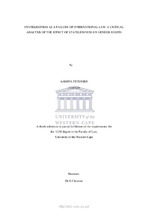Statelessness as a failure of international law: a critical analysis of the effects of statelessness on gender rights
Abstract
Statelessness is a global human rights problem affecting a vast number of individuals, families and communities worldwide. The concept of statelessness comes to existence as a conflict that was created by international law. Article 15 of the Universal Declaration of Human Rights provides that everyone has the right to a nationality. Article 1 of the International Covenant on Civil and Political Rights provides the right to state sovereignty. The latter article thus allows states to enact laws conferring nationality as it deems fit, even if such laws offend the former article. In addition, this phenomenon affects men and women differently, something which international law fails to take proper cognisance of. This causes the failure of properly being able to regulate the issue of statelessness. Furthermore, the failure at law stumps the growth of women by be destabilising and disempowering it.
While Article 9 of Convention on the Elimination of All Forms of Discrimination Against Women provides that there should be no discrimination between men and women with regard to the acquisition or conferral of nationality. However, there are 27 countries who maintain gender-based discriminatory nationality laws. One of the main reasons for generational statelessness is gender –based discriminatory nationality laws. The problem of statelessness will continue to persist if nothing is done to reform the laws of those countries who maintain the gender-based discriminatory nationality laws.
This thesis will examine the legal gaps at international law in addressing the issue of statelessness. It will also look at States that continue to implement nationality laws and practices which are gender discriminatory. This thesis will argue that Article 9 is used as a basis of accountability for violator States who fail to protect women who have been subjected to human rights violations as a result of statelessness. It will also provide recommendations that will aid in acquiring effective change that could ultimately lead to the eradication of statelessness.

